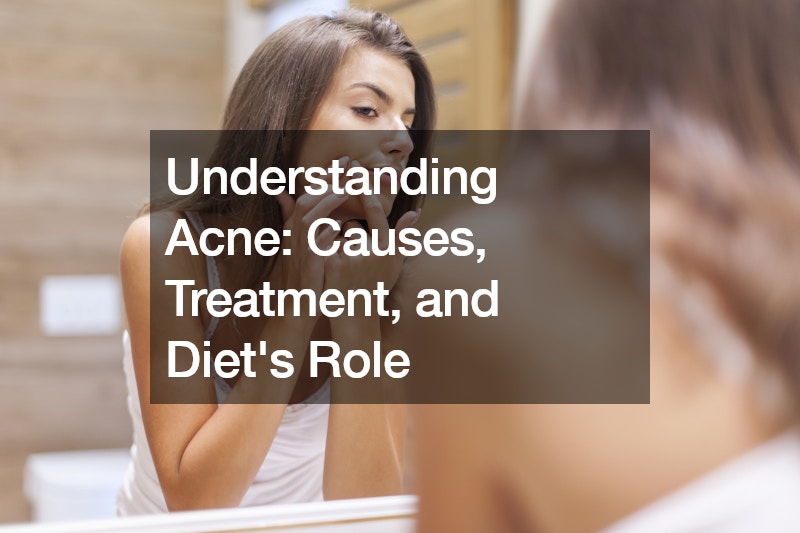Acne, a common skin condition, perplexes many individuals seeking clear and healthy skin. Dr. Jay Wofford, a board-certified dermatologist, sheds light on this concern, emphasizing three key factors contributing to acne: hair follicle occlusion, bacterial overgrowth, and ensuing inflammation. Stress, though not the root cause, can worsen the condition, while the impact of diet remains a complex and debated aspect. This article explores the multifaceted nature of acne, delves into the potential role of diet, emphasizes the importance of seeking effective acne treatments, and introduces additional relevant topics for a comprehensive understanding.
Causes of Acne: A Trifecta
Acne’s origins lie in a trifecta of factors – the occlusion of hair follicles, overgrowth of bacteria, and ensuing inflammation. These components intertwine, creating a perfect storm for the development of acne.
Hair follicles on the face become obstructed, trapping oils and dead skin cells. The trapped environment becomes a breeding ground for bacteria, particularly Propionibacterium acnes. The proliferation of bacteria triggers an inflammatory response, leading to the characteristic redness and swelling associated with acne.
Understanding these causes is crucial in addressing acne effectively. Individuals often wonder if stress directly causes acne. While stress isn’t the primary culprit, it can exacerbate the condition. Stress triggers inflammatory responses in the body, and given that acne is an inflammatory skin condition, stress can contribute to its worsening. Managing stress levels, therefore, becomes an important aspect of comprehensive acne care.
Diet’s Role in Acne: Unraveling the Mystery
The relationship between diet and acne remains a puzzle for many. Dr. Wofford highlights the complexity of this association, acknowledging the conflicting information surrounding it. However, recent evidence points towards a potential link between diet and acne, particularly concerning processed sugars and carbohydrates.
Diets rich in processed sugars and carbohydrates are known to induce a pro-inflammatory state in the body. Inflammation is a common denominator in acne, and this dietary-induced inflammation may exacerbate the condition. While the exact impact of diet on acne remains uncertain, adopting a diet low in processed sugars and carbohydrates may be a sensible step for individuals seeking to manage their acne.
The Frustration of Acne: Seeking Effective Treatment
Living with acne can be frustrating, impacting both one’s quality of life and self-esteem. For those who have experimented with over-the-counter treatments without success, it becomes essential to seek professional help. Acne treatments administered by board-certified dermatologists offer a more targeted and effective approach.
These treatments may include topical or oral medications aimed at reducing inflammation, controlling bacterial overgrowth, and preventing further obstruction of hair follicles. Dermatologists tailor treatments based on the severity and type of acne, ensuring a personalized and efficient approach.
Beyond Topical Solutions: Lifestyle Adjustments
In addition to professional treatments, incorporating lifestyle adjustments can further enhance acne management. Regular cleansing with gentle, non-comedogenic products helps maintain skin hygiene and prevent pore blockages. Choosing oil-free and non-comedogenic skincare and makeup products reduces the risk of exacerbating acne.
Moreover, individuals should be mindful of their skincare routines, avoiding excessive scrubbing or picking at acne lesions, as this can worsen inflammation and lead to scarring. Protecting the skin from harmful ultraviolet (UV) rays with sunscreen is crucial, as some acne medications can increase sensitivity to the sun.
Addressing Hormonal Influences
Hormonal fluctuations, particularly during adolescence, menstruation, and pregnancy, can contribute to acne development. Understanding and managing hormonal influences is vital for effective acne control. Dermatologists may recommend hormonal therapies, such as oral contraceptives, to regulate hormonal imbalances and reduce acne severity.
The Role of Genetics in Acne
Genetic factors contribute significantly to an individual’s vulnerability to acne. A family history of severe acne can heighten the chances of developing similar skin conditions. Awareness of the genetic aspect of acne enables dermatologists to tailor treatment strategies to each patient’s specific needs.
Environmental Factors and Acne
Environmental factors, such as pollution and humidity, can exacerbate acne by clogging pores and increasing bacterial growth. Individuals living in urban areas or exposed to high levels of pollution may experience more severe acne. Proper skincare and protection from environmental pollutants are essential in managing acne effectively.
Conclusion: Taking Acne Seriously
In conclusion, acne is a multifaceted skin condition influenced by various factors, including hair follicle occlusion, bacterial overgrowth, inflammation, stress, diet, hormonal influences, genetics, and environmental factors. While stress and diet may not be the primary causes, they can certainly worsen the condition. Managing stress levels, adopting a skin-friendly diet, seeking professional acne treatments, incorporating lifestyle adjustments, addressing hormonal influences, understanding genetic predispositions, and protecting the skin from environmental pollutants are crucial aspects of comprehensive acne management. With a holistic approach, clear and healthy skin is within reach, alleviating the frustration often associated with persistent acne.
.

